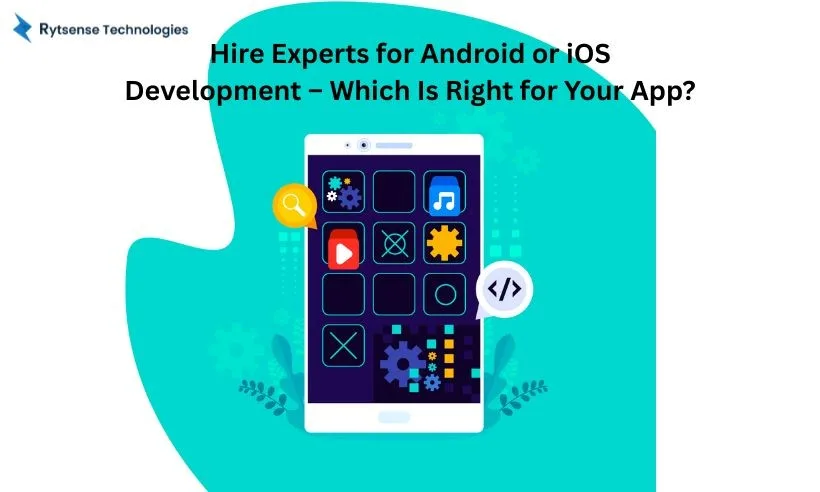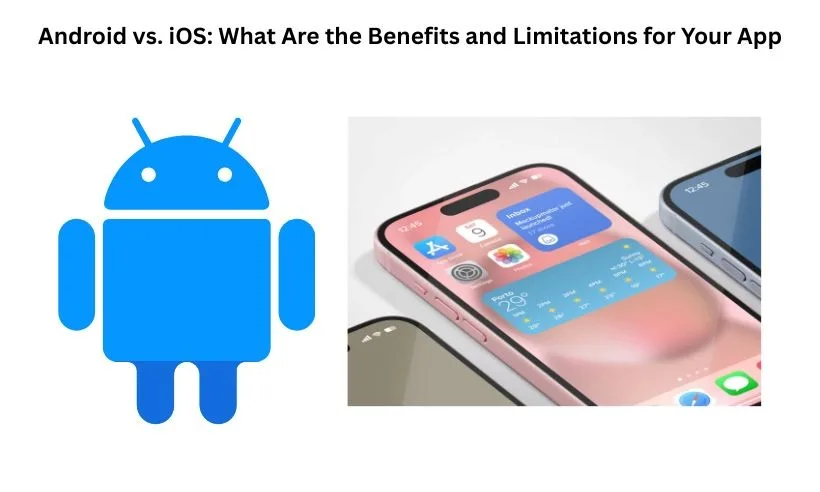1. Choosing the Best-Fit Platform: A Key Decision for Successful Mobile App
Your platform choice doesn’t just affect what devices your app runs on. It directly influences your budget, time-to-market, user engagement, and ROI. Let’s say you’re targeting the U.S. or European market — launching on iOS may give you better monetization and quicker app store approvals. On the other hand, if you're focusing on Asia or MENA regions, Android's broader reach might be more effective. Startups like Clubhouse first launched on iOS to tap into a premium, early adopter audience, while many fintech apps in India began with Android to maximize reach. Your choice should align with your growth model and business priorities.

2.Android vs iOS – A Quick Overview for Decision-Makers
3.Development Differences That Influence Your Decision
3.1.Time-to-Market: Which is Faster to Launch?
3.2 Development Cost: Which Platform Fits Your Budget?
3.3. Programming Language & Tech Stack Preferences
- ● Android development uses Java or Kotlin, with Kotlin now being the preferred language endorsed
- ● iOS development utilizes Swift, known for its modern and efficient features, or Objective-C, primarily used for maintaining legacy applications.
4. Android vs. iOS: What Are the Benefits and Limitations for Your App?

4.1. Android Development: Benefits & Challenges
- ● Market Reach: Android powers billions of devices globally, especially in developing regions.
- ● Customization: More flexibility to customize UI/UX and app functionality.
- ● Open Ecosystem: Easier app publishing process with fewer restrictions.
Challenges:
- ● Fragmentation: Supporting various screen sizes, OS versions, and hardware capabilities increases complexity.
- ● Testing Overhead Requires more time and resources to ensure consistent user experience..
4.2. iOS Development: Benefits & Challenges
- ● Enhanced Monetization: : iOS audiences generally show a higher willingness to pay for apps and in-app content.
- ● Consistency: Limited device types mean smoother UX and easier testing.
- ● Early Adoption of Features: Apple users adopt new OS updates faster.
Challenges:
- ● App Store Approval: Strict guidelines can delay app launches..
- ● Smaller User Base:Less global reach compared to Android.
5. Consider Your Business Goals Before Hiring
5.1. Target Audience
- ● If you aim for mass-market penetration in diverse geographies, Android is your go-to.
- ● For targeting premium users or regions like the US and Europe, iOS offers a better ROI.
5.2. Speed vs. Polish
- ● Need to prototype fast? Android offers flexibility.
- ● Require a polished UX for early adopters? iOS is better suited.
5.3. Growth Strategy
- ● Start with a single platform to validate your idea, then scale.
- ● A hybrid or cross-platform might be better for a simultaneous launch.
6. Hybrid App Development: The Best of Both Worlds?
Pros:
- ● Faster MVP launches
- ● Cost efficiency
- ● Easier maintenance
Cons:
- ● May lack performance or access to device-specific features
- ● Sometimes UI/UX isn’t as polished as native apps
Top app development companies in Dubai often recommend hybrid development for startups with limited budgets or uncertain target platforms.
7. Why Hiring Platform-Specific Experts Matters
- ● Deep knowledge of OS-specific UI/UX principles
- ● Performance-optimized coding that fosters higher user retention
- ● Effortless handling of the submission procedures for both the App Store and Play Store
Whether outsourcing to a mobile app development company in Dubai or hiring local app developers in Dubai , ensure their portfolio reflects strong native app expertise.
8. How to Hire the Right Android or iOS Development Expert
9. Cost of Hiring Android and iOS Developers
| Pricing Model | Android Developer | iOS Developer |
|---|---|---|
| Hourly Rate | $25 – $70 | $30 – $80 |
| MVP Project Cost | $5,000 – $15,000 | $5,000 – $12,000 |
| Enterprise Project | $50,000+ | $50,000+ |
Location also impacts cost: hiring through a mobile app development company in UAE or Dubai is generally pricier than offshore options but offers better communication and regional expertise.
10. Success Stories: Businesses That Hired the Right Talent
- ● Time-to-market: 3 months for MVP
- ● Downloads: 500,000+ within one year
- ● Revenue: Achieved profitability within 6 months via ad monetization
Case Study 2: iOS-First Fitness App in the US
- ● Monetization: Subscription-based model
- ● User rating: 4.8/5 on App Store
- ● Growth: Achieved 100,000 premium subscribers in 18 months
11. Final Recommendation – Which Platform Should You Choose?
- ● Android: For startups targeting emerging markets and mass audiences.
- ● iOS: Ideal for reaching premium users who tend to have greater spending capacity.
- ● Hybrid: If you want to test both platforms quickly and cost-effectively.
12. Ready to Build? Hire the Right Android or iOS Experts Today

The Author
Karthikeyan
Co Founder, Rytsense Technologies